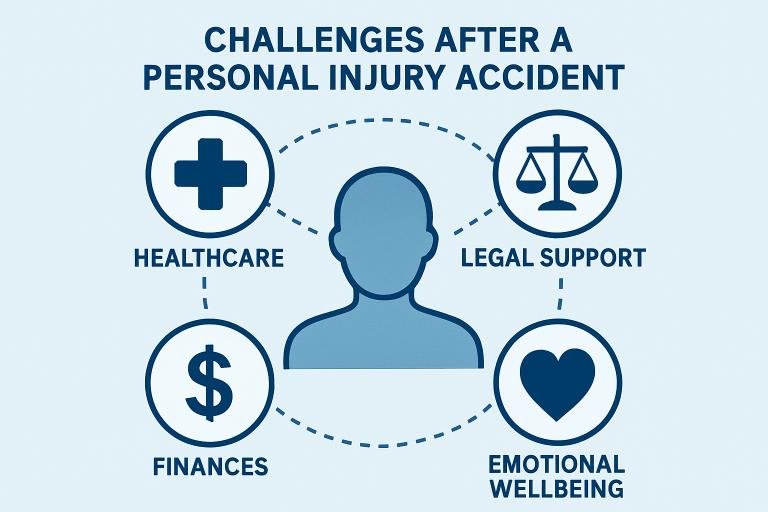Key Takeaways
- Seek prompt medical attention even if you feel fine initially, as some symptoms may arise later.
- Carefully document the accident scene, injuries, and related evidence for insurance and legal processes.
- Engage carefully with insurance companies, prioritizing your rights and consulting professionals when needed.
- Acknowledge and care for the emotional and psychological impact, including anxiety and PTSD.
- Contacting a personal injury attorney can help ensure you don’t lose your chance for fair compensation.
Suffering a personal injury accident introduces not only unexpected pain but also a tangle of legal, medical, and financial hurdles. Getting informed about the most common post-accident challenges allows you to protect your health, rights, and future. If you or a loved one has been affected, speaking with a trusted Colorado personal injury lawyer early in the process can be critical to confidently navigating the journey ahead.
From delayed injuries to tough conversations with insurance adjusters, acting quickly and armed with information can significantly affect your physical recovery and legal standing. Each accident impacts people differently, but almost every case involves difficult choices and emotional strain. Learning about these hurdles in advance will help you respond proactively after an incident.
Delayed Medical Symptoms
Not all injuries appear at the time of the accident. Conditions such as whiplash, concussions, or internal bleeding might only show symptoms after hours or even days. According to resources from Mayo Clinic, signs like dizziness, confusion, or pain that increase with time should never be ignored. Immediate and thorough medical evaluation is crucial, as untreated injuries can worsen, and insurers may use gaps in treatment to dispute claims. Consulting a workers compensation lawyer can also help protect your rights if delayed symptoms affect your ability to work or require long-term medical care.
Documenting the Accident Scene
One of the first things you should do after an accident is gather as much evidence as possible. Take photos of the scene, injuries, vehicles, or damaged property from multiple angles. Secure witness statements with their contact information, and obtain an official police report if available. This documentation establishes what happened and who is liable, forming the foundation of your insurance and legal claims.
Interactions with Insurance Companies
After an accident, you may quickly hear from an insurance adjuster. While they often present themselves as helpful, remember that their objective is to protect the insurer’s bottom line—not yours. Be cautious when making statements or signing documents. Even innocent remarks may be used to reduce or deny your claim. Consulting an attorney before any significant interaction provides a safeguard against unintentional mistakes. According to West Coast Trial Lawyers, knowing your rights and letting a professional speak on your behalf can make a substantial difference in settlement outcomes.
Emotional and Psychological Impact
Personal injury accidents often lead to emotional challenges such as anxiety, mood swings, depression, or even post-traumatic stress disorder (PTSD). These effects can be as disabling as physical injuries and shouldn’t be ignored. It’s critical to recognize when you or your loved ones are struggling emotionally and to seek help from a qualified mental health professional. Support networks, therapy, and counseling are important for a well-rounded recovery and can often be included in your claim for compensation.
Financial Strain and Lost Wages
The financial shock of an accident is felt immediately and sometimes long-term. Medical procedures, rehabilitation, prescriptions, and time off work add up quickly. Documenting all related expenses—transportation, home modifications, and lost wages—will strengthen your compensation claim. Keep all receipts, medical records, and correspondence regarding your case. Many accident survivors may also experience long-term disruptions to their earning capacity, so it is important to project the full financial impact with expert support if necessary.
Social Media Pitfalls
After an accident, what you share online can impact your legal case. Insurance adjusters and defense attorneys commonly monitor claimants’ social media for anything that contradicts their claims or suggests they are less injured than reported. Even posts about unrelated activities or “feeling fine” can be twisted to undermine your case. The best approach is to limit or pause your social media activity entirely until your case is resolved, protecting your privacy and claim.
Legal Complexities and Statute of Limitations
Laws regarding personal injury vary by state and are frequently updated. There are rigid deadlines, known as statutes of limitations, which can range from one to several years depending on your location and the nature of the claim. Missing these deadlines commonly results in losing the right to pursue compensation. Consulting an attorney familiar with your specific state laws is vital to protecting your interests.
Importance of Legal Representation
Navigating a personal injury claim—while dealing with pain, stress, and financial worry—can be overwhelming. Partnering with an experienced personal injury lawyer means you have someone advocating for your rights, handling communications, and helping you avoid mistakes that could jeopardize your settlement. Legal representatives also know how to assess claims, negotiate effectively, and take cases to court if necessary. This support lets you focus on recovery, knowing your case is in capable hands.
After an accident, being aware of and preparing for these challenges makes a real difference in your recovery and outcome. Understanding your rights, acting thoughtfully, and securing the right guidance will empower you to navigate this difficult time more successfully.
Final Thoughts
Recovering from a personal injury goes beyond physical healing—it also requires protecting your financial stability and emotional well-being. By acting quickly, staying informed, and seeking the right support, you give yourself the best chance at securing fair compensation and moving forward confidently.



